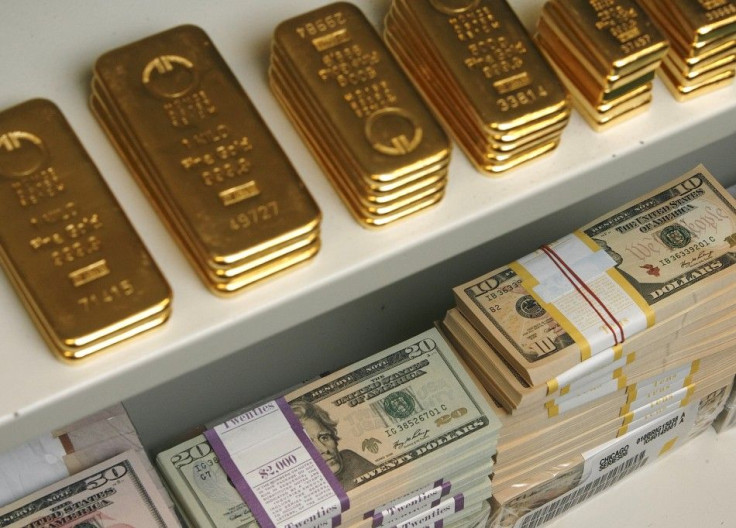How Gold Fits Into An Investment Portfolio

(REUTERS) -- I've always had mixed feelings about gold. Is it an alternative currency? A speculator's refuge from political or fiscal instability? A reliable inflation indicator? Turns out it's maybe all of the above.
What role should gold play in your portfolio? Certainly it's no substitute for bonds, which held up well in 2008 and rarely lose money in low-inflation periods. As an inflation hedge, though, you may be better off holding dividend-paying stocks and inflation-protected securities (TIPS). Inflation will return eventually, which means you need to start protecting yourself now from bond-price declines.
Whatever view you take on gold, most financial savants suggest it should occupy no more than 10 percent of your portfolio; and don't try to time its price movements. And while it can fulfill many roles imperfectly, its appeal changes with the moods of the market's animal spirits. And here's why:
ALTERNATIVE CURRENCY?
For one thing, gold's worth in a portfolio depends on how it reacts to market sentiment. Does it go up in price when the threat of inflation is imminent or present? According to new research by Eric Weigel of the Leuthold Group in Minneapolis, he's confirmed that there's a positive link between gold prices and inflation expectations. That makes sense since higher costs of living and over-printing of money by governments tend to devalue paper currencies.
Yet if you look at the relationship between the dollar's value and gold, the relationship isn't quite that clear. When Weigel looked at gold returns and dollar movements over the past dozen years, gold occasionally rose when the dollar declined, showing a marginally statistically significant link. That backed the argument that gold behaves as an alternative to dead-tree money, but only since 2010.
The debate that gold is an alternative currency continues to be contentious. It is not a replacement for the dollar, euro, yen or yuan. Until stocks, bonds and consumer goods are denominated in gold bullion prices, gold may have some store of value, but it's not readily exchanged. You can't drop a gold coin into a vending machine and get a transit ticket or pay a bill from Macy's - yet.
GOLD AS A STOCK MARKET HEDGE?
What about stock market volatility and gold? Here the picture is muddy. From 2006 to 2007, Weigel found, gold behaved more like a risky asset and moved in lock step with stocks. Yet after the 2008 meltdown, that was no longer the case and gold often moved independently of stock prices.
So to say that gold is a consistent hedge against U.S. stocks or the dollar is on weak ground. You also have to keep in mind that pundits have been warning of soaring inflation for several years, although it's failed to materialize in any significant way in the U.S. and is virtually absent from most of developed Europe as the continent deals with recession and its unresolved fiscal crisis.
What does gold do well in terms of market tracking? I had to turn to some charts from the Chicago Board Options Exchange, which started a gold volatility index (GVZ) in August 2008 (click onlink.reuters.com/cad49s). The index measures the market's expectation of 30-day volatility of gold prices and tracks options on the widely traded SPDR Gold Shares exchange-traded fund, the largest ETF that owns gold bullion. The volatility index is basically a gauge for where traders think gold prices are headed.
Although the gold volatility index doesn't have much history - which makes it tough to see any long-term patterns - it pretty much parallels crude oil prices and euro volatility. Even more telling is the gold index's inverse movement against the S&P 500 index last summer, when stocks plummeted during the height of the U.S. debt ceiling/euro crisis. At that time, gold seemed to be a refuge - at least in terms of traders' expectations.
INDICATOR OF INFLATION?
Maybe gold, as Weigel suggests, is playing different roles at different times. During periods of dominant worries about currency devaluation in the absence of other mega-downturns, it acts as an indicator of coming inflation. When crises emerge out of Washington or Europe, it's a bulwark against stock and currency declines.
But when global stocks tank as they did in 2007 and 2008, the metal is no safe haven at all. It could be that when nearly every market is tanking, investors are selling their gold, too, to cover other losses and margin calls.
Still, there's a reason why central banks from Europe to China and major hedge funds like Soros Management continue to stock up on bullion - often more than quadrupling their holdings. Do they fear currency collapses? Inflation roaring back? Or are they buying on the dips?
Maybe all of the above apply, which is why it has a place in your portfolio if your fear the worst for stocks or currencies. It serves a unique role when dealing with the fearsome animal spirits of the market.
© Copyright Thomson Reuters 2024. All rights reserved.






















